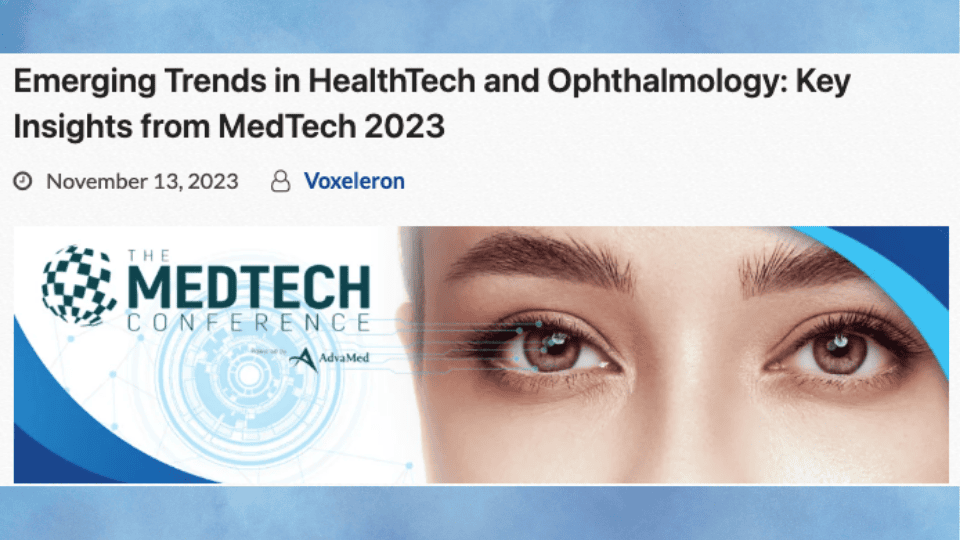
Emerging Trends in HealthTech and Ophthalmology: Key Insights from MedTech
MedTech recently held its annual conference, showcasing the latest developments in the HealthTech market. Among the key takeaways were pivotal trends influencing the industry, shedding light on the crucial aspects that will redefine patient care, data privacy, collaboration, and the integration of artificial intelligence in healthcare.
Navigating Ethical Gray Areas in Handling Patient Data
Data privacy remains a cornerstone in the healthcare landscape. Numerous discussions at the event focused on advocating data transparency and equity. Speakers emphasized the complexity and ethical considerations revolving around data use, ownership, monetization, and the responsibilities associated with leveraging it for the advancement of healthcare technologies. A relevant example is that, as clinical trials progress, patients might lose control over how their data is distributed, potentially raising concerns about privacy and ethical responsibilities surrounding its utilization.
Emerging trend:
An intriguing innovation surfaced during the sessions: the concept of a “nutritional label” for applications, which would provide comprehensive information on the origins of its data and its validation. This label would transparently showcase data usage and permissions, allowing consumers to both see where the data comes from as well as indicate its potential bias and limitations. Such transparency can help empower patients to better understand and control their own data.
Balancing Providers’ and Payers’ Demands
Healthcare providers and payers are increasingly scrutinizing their spending, seeking to understand the value they receive in return. As AI initiatives become more influential in healthcare, AI companies are encountering challenges in articulating their value proposition. Their dilemma lies in deciding whether their AI-driven tools could primarily benefit providers by improving workflows, or better benefit payers by optimizing patient care. This intricacy has made it difficult for AI companies to distinctly quantify and communicate the precise value they would bring to the healthcare landscape.
Emerging Trend:
A value-based care approach may be a needed compromise. This approach aims to both streamline workflows and enhance patient care with the ultimate goal of improving patient outcomes. Leveraging AI-based care plans was discussed extensively at MedTech 2023, highlighting scenarios like guiding therapy decisions or automated utilization management. For example, based on historical data AI can aid in developing optimal care plans, particularly beneficial in complex diagnoses like cancer. Such optimized care plans could have the benefit of both streamlining care and improving outcomes.
AI’s Maturity Curve and Its Implications for Ophthalmology
In ophthalmic research, interoperability challenges persist, hindering the sharing and integration of data. Unlike almost all other medical disciplines that have already adopted a unified data standard (i.e. DICOM), ophthalmology remains siloed. This most definitely hinders AI applications from developing. For example, the recent FDA draft guidance for a Predetermined Change Control Plan in March 2023 foresees a future where AI algorithms can be approved together with plans to adapt to new data/populations without having to resubmit every time the training data is changed. This would be a huge step forward in efficiency and innovation, but only if the data formats and parameters are well understood at submission time, something ophthalmology’s siloed data landscape makes very difficult.
Emerging trend:
In ophthalmology. the trend in applied AI has emphasized augmentation over replacement, showing the potential for AI to improve and complement traditional methodologies rather than completely replace them. In other words, AI is not replacing doctors, but it is potentially replacing doctors who don’t use AI.
Final Thoughts
The insights from MedTech 2023 pave the way for progressive strides in HealthTech. Healthcare providers, technology experts, and regulatory bodies were encouraged to work together to make sense of as well as embrace new solutions for improving patient care.
As the landscape continues to evolve, the integration of innovative technologies, ethical considerations, and a collaborative approach will be crucial for the progression and transformation of healthcare. These emerging trends and advancements offer a roadmap for stakeholders to better navigate today’s challenges. Embracing these insights and fostering collaborative efforts will be the key to driving innovation and improving patient care in the years to come. It was great to be part of this important conversation.
Discover what’s next in HealthTech and ophthalmology with our AI-based and device-independent solutions. Get in touch with us today or, visit voxeleron.com to learn more and request a demo.
